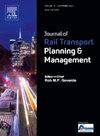Weekly crew scheduling for freight rail engineers: A network approach
IF 2.7
Q3 TRANSPORTATION
Journal of Rail Transport Planning & Management
Pub Date : 2025-04-02
DOI:10.1016/j.jrtpm.2025.100519
引用次数: 0
Abstract
Freight rail engineers and conductors have long faced unpredictable and inflexible work schedules, leading to on-the-job fatigue, compromised safety, and poor work-life balance. This paper aims to construct robust weekly schedules for these crew members to alleviate the pressures associated with irregular and unpredictable work hours. The scheduling problem is formulated as a multi-commodity network flow problem on a directed time-space graph. Both two-city and three-city districts are addressed. To account for the variability in travel times, a set of scenarios is defined in which demand is increased by up to 20% to build slack into the schedules. The results are validated using Monte Carlo simulation where 100 random weekly instances are generated for each city pair and key performance metrics assessed. Major findings show that (i) optimal weekly schedules can be constructed in minutes for engineers in crew districts with two cities, and in several hours for engineers in crew districts with three cities, (ii) different percentages of demand increase significantly affect the degree of robustness, and (iii) forming crew districts with three cities rather than two gives better results in terms of required number of engineers and trip coverage rates.
货运铁路工程师每周班组调度:网络方法
长期以来,货运铁路工程师和售票员一直面临着不可预测和不灵活的工作时间表,导致工作疲劳、安全性受损以及工作与生活的不平衡。本文旨在为这些船员构建健全的每周时间表,以减轻与不规律和不可预测的工作时间相关的压力。将调度问题表述为有向时空图上的多商品网络流问题。两个城市和三个城市的地区都有地址。为了考虑出行时间的可变性,我们定义了一组场景,在这些场景中,需求最多增加20%,从而在时间表中建立空闲。使用蒙特卡罗模拟对结果进行验证,其中为每个城市对生成100个随机的每周实例,并评估关键性能指标。主要研究结果表明:(1)两个城市的船员区工程师可以以分钟为单位构建最优周计划,三个城市的船员区工程师可以以几个小时为单位构建最优周计划;(2)不同的需求增长百分比显著影响鲁棒性程度;(3)三个城市的船员区比两个城市的船员区在所需工程师数量和行程覆盖率方面效果更好。
本文章由计算机程序翻译,如有差异,请以英文原文为准。
求助全文
约1分钟内获得全文
求助全文
来源期刊

Journal of Rail Transport Planning & Management
TRANSPORTATION-
CiteScore
7.10
自引率
8.10%
发文量
41
 求助内容:
求助内容: 应助结果提醒方式:
应助结果提醒方式:


